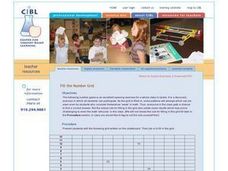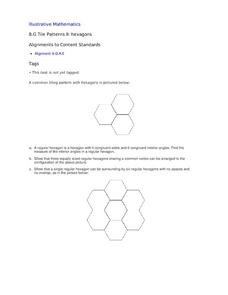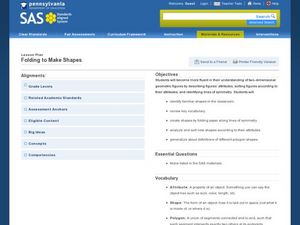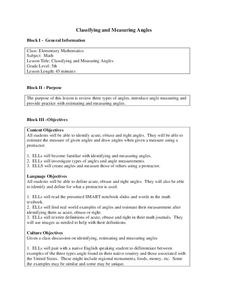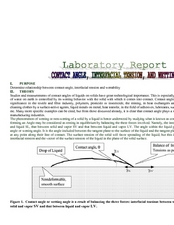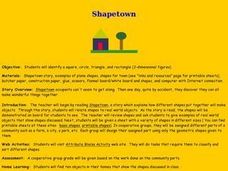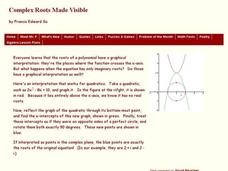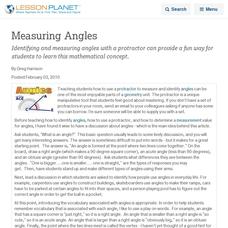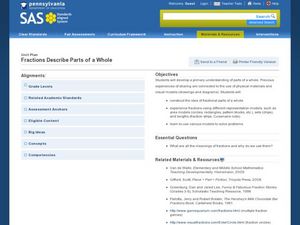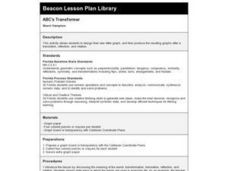Inside Mathematics
Graphs (2006)
When told to describe a line, do your pupils list its color, length, and which side is high or low? Use a worksheet that engages scholars to properly label line graphs. It then requests two applied reasoning answers.
EngageNY
Four Interesting Transformations of Functions (Part 3)
Continue the study of transformations with an examination of horizontal stretches, shrinks, and reflections. Individuals use the same process used in parts one and two of this series to examine horizontal changes. The resource also...
Kenan Fellows
Math Made Simple as 1-2-3: Simplified Educational Approach to Algebra
Writing an equation of a line is as easy as m and b. A lesson presentation gives individuals different strategies for writing equations of lines. Some items provide a slope and a point while others provide two points. Whatever the given,...
Curated OER
Fill the Number Grid
Patterns emerge as the class works together to fill in a number grid. This whole group activity is designed to make all learners feel successful, and ultimately turns into a lesson on the least common multiple.
NASA
Keeping Nine Eyes on the Weather
Take a look at climate change from another angle. Readers learn about the MISR instrument on the Terra satellite and how it studies Earth. Pupils experience how the multiple cameras give scientists multiple views so they can better study...
Illustrative Mathematics
Lines of Symmetry for Quadrilaterals
Explore how lines of symmetry help define different categories of quadrilaterals. Looking at a square, rectangle, trapezoid, and parallelogram, young mathematicians discover that each shape has its own, unique symmetry. Encourage your...
Curated OER
Tile Patterns II: Hexagons
After learning that the sum of interior angles for triangles is 108 degrees, take it further to show that the sum of angles in any polygon is the same! Using hexagons, pupils practice finding the measure of the six congruent angles. Make...
Curated OER
Folding to Make Shapes
Second graders identify different polygons and their attributes. In this geometry lesson, 2nd graders get to know polygons by studying the vocabulary and finding polygons in their classroom. They create these shapes and then find their...
Curated OER
"Geotown" Scrapbook
Students create a scrapbook. In this geometry lesson, students use digital cameras to take pictures of geometrical concepts. Students use the pictures to create a "Geotown" scrapbook.
Curated OER
Classifying and Measuring Angles
Fifth graders explore the three types of angles. For this math lesson, 5th graders estimate the measure of angles and draw the angles using a protractor.
Pennsylvania Department of Education
Problem Solving with Fractions
Solve story problems using fractions or decimals. Then, determine the reasonableness of answers using estimation.The detailed lesson includes essential questions, vocabulary, a materials list, and links to related units.
Curated OER
Quadrilateral Explorations-Grade Nine
Ninth graders investigate quadrilaterals. In this geometry lesson plan, 9th graders examine and classify quadrilaterals using the slope, midpoint and distance formulas. Additionally, students create various quadrilaterals...
Curated OER
Contact Angle. Interfacial Tension and Wetting
Students determine the contact angle of water on different surfaces. In this physics lesson, students calculate their percent error using a mathematical formula. They explain the advantages of using non-wetting surface for certain...
Curated OER
Transformations and Rotations
Learners define and identify transformation and rotation. In this geometry lesson, students define rotations as congruence or isometry. They find the coordinates of an image and pre-image.
Curated OER
Surface Area
In this geometry instructional activity, 10th graders define surface area, net and lateral face. They calculate the surface areas of cones, prisms and cubes. There are 9 surface area questions.
Curated OER
Shapetown
Students identify basic geometric shapes. In this geometry lesson, students read the book Shapetown and identify the various shapes from the story. Students are given a sheet and draw part of a town using only shapes.
Curated OER
Complex Roots Made Visible
In this algebra worksheet, 11th graders solve quadratic functions using the quadratic formula. They identify the negative roots using complex roots. There is an answer key with this problem.
Curated OER
Time Zone Math
In this algebra learning exercise, students calculate the different time of the day that different countries see the sun. They convert between different time zones. There are 3 questions with an answer key.
Curated OER
Measuring Angles
Identifying and measuring angles with a protractor can provide a fun way for students to learn this mathematical concept.
Curated OER
Performing Transformations
Learners investigate the concepts relating to creating a tessellation. They include using pattern blocks in order to create interconnecting patterns. Students review translations, rotations, and reflections.
Curated OER
Fractions Describe Parts of a Whole
Third graders represent fractions as part of a whole. In this fractions lesson, 3rd graders use manipulatives to show how a fraction is a part of a whole. This lesson includes individual practice and an assessment instead of direct...
Curated OER
Fractions of a Set
Third graders use fractions to describe part of a set. In this fractions lesson, 3rd graders are introduced to fractions through a book and use pattern blocks to describe a fraction as a part of a set. This lesson includes a scripted...
Curated OER
ABC's Transformer
Fourth graders design their own letter graph, and then produce the resulting graphs after a translation, reflection, and rotation. After a review of vocabulary, 4th graders create their graphs using crayons.
Curated OER
Lines and Angles
Sixth graders explore lines and angles. They create visual representations of lines, rays and angles by drawing them on paper and using a geoboard. On paper, 6th graders write a summary of the characteristics of their representations.



